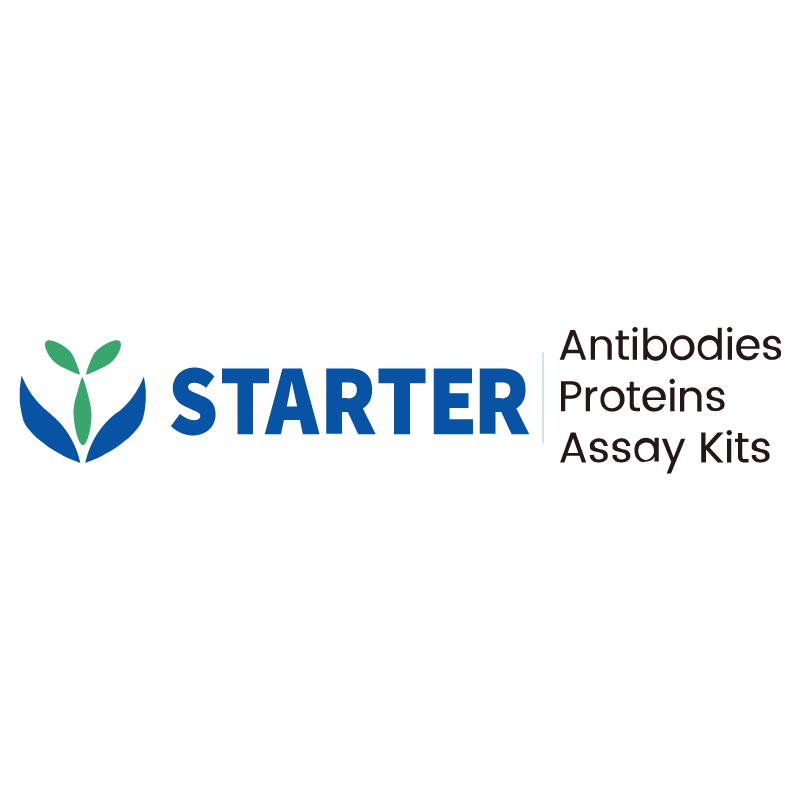WB result of CDK9 Rabbit pAb
Primary antibody: CDK9 Rabbit pAb at 1/1000 dilution
Lane 1: HT-29 whole cell lysate 20 µg
Lane 2: HeLa whole cell lysate 20 µg
Lane 3: HL-60 whole cell lysate 20 µg
Lane 4: 293T whole cell lysate 20 µg
Secondary antibody: Goat Anti-rabbit IgG, (H+L), HRP conjugated at 1/10000 dilution
Predicted MW: 43, 53 kDa
Observed MW: 38, 50 kDa
Product Details
Product Details
Product Specification
| Host | Rabbit |
| Antigen | CDK9 |
| Synonyms | Cyclin-dependent kinase 9; C-2K; Cell division cycle 2-like protein kinase 4; Cell division protein kinase 9; Serine/threonine-protein kinase PITALRE; Tat-associated kinase complex catalytic subunit; CDC2L4; TAK |
| Immunogen | Synthetic Peptide |
| Location | Cytoplasm, Nucleus |
| Accession | P50750 |
| Antibody Type | Polyclonal antibody |
| Isotype | IgG |
| Application | WB, IHC-P |
| Reactivity | Hu, Ms, Rt |
| Positive Sample | HT-29, HeLa, HL-60, 293T, NIH/3T3, RAW264.7, mouse, mouse liver, PC-12, C6, rat testis |
| Predicted Reactivity | Bv |
| Purification | Protein A |
| Concentration | 0.5 mg/ml |
| Conjugation | Unconjugated |
| Physical Appearance | Liquid |
| Storage Buffer | PBS, 40% Glycerol, 0.05% BSA, 0.03% Proclin 300 |
| Stability & Storage | 12 months from date of receipt / reconstitution, -20 °C as supplied |
Dilution
| application | dilution | species |
| WB | 1:1000 | Hu, Ms, Rt |
| IHC-P | 1:1000 | Hu, Ms, Rt |
Background
CDK9 protein, located at 9q34.11 and consisting of 372 amino acids, is a CDC2-related kinase and the catalytic subunit of the positive-transcription elongation factor b (P-TEFb). It was first identified in 1994 and is primarily involved in regulating the elongation phase of transcription by RNA polymerase II (RNAPII). CDK9 forms complexes with cyclin T1, T2a, T2b, or K, and these complexes phosphorylate the C-terminal domain (CTD) of RNAPII and negative-transcription elongation factors, thereby overcoming promoter-proximal pausing and facilitating transcription elongation. CDK9 is also involved in transcription initiation and termination, and its activity is regulated by post-translational modifications such as phosphorylation and acetylation. Additionally, CDK9 has been implicated in various cellular processes, including immune responses and metabolic regulation, and is a potential therapeutic target in cancer and other diseases.
Picture
Picture
Western Blot
WB result of CDK9 Rabbit pAb
Primary antibody: CDK9 Rabbit pAb at 1/1000 dilution
Lane 1: NIH/3T3 whole cell lysate 20 µg
Lane 2: RAW264.7 whole cell lysate 20 µg
Lane 3: mouse testis lysate 20 µg
Lane 4: mouse liver lysate 20 µg
Secondary antibody: Goat Anti-rabbit IgG, (H+L), HRP conjugated at 1/10000 dilution
Predicted MW: 43, 53 kDa
Observed MW: 38, 50 kDa
WB result of CDK9 Rabbit pAb
Primary antibody: CDK9 Rabbit pAb at 1/1000 dilution
Lane 1: PC-12 whole cell lysate 20 µg
Lane 2: C6 whole cell lysate 20 µg
Lane 3: rat testis lysate 20 µg
Secondary antibody: Goat Anti-rabbit IgG, (H+L), HRP conjugated at 1/10000 dilution
Predicted MW: 43, 53 kDa
Observed MW: 38, 50 kDa
Immunohistochemistry
IHC shows positive staining in paraffin-embedded human testis. Anti-CDK9 antibody was used at 1/1000 dilution, followed by a HRP Polymer for Mouse & Rabbit IgG (ready to use). Counterstained with hematoxylin. Heat mediated antigen retrieval with Tris/EDTA buffer pH9.0 was performed before commencing with IHC staining protocol.
IHC shows positive staining in paraffin-embedded human breast cancer. Anti-CDK9 antibody was used at 1/1000 dilution, followed by a HRP Polymer for Mouse & Rabbit IgG (ready to use). Counterstained with hematoxylin. Heat mediated antigen retrieval with Tris/EDTA buffer pH9.0 was performed before commencing with IHC staining protocol.
IHC shows positive staining in paraffin-embedded human lung cancer. Anti-CDK9 antibody was used at 1/1000 dilution, followed by a HRP Polymer for Mouse & Rabbit IgG (ready to use). Counterstained with hematoxylin. Heat mediated antigen retrieval with Tris/EDTA buffer pH9.0 was performed before commencing with IHC staining protocol.
IHC shows positive staining in paraffin-embedded mouse spleen. Anti-CDK9 antibody was used at 1/1000 dilution, followed by a HRP Polymer for Mouse & Rabbit IgG (ready to use). Counterstained with hematoxylin. Heat mediated antigen retrieval with Tris/EDTA buffer pH9.0 was performed before commencing with IHC staining protocol.
IHC shows positive staining in paraffin-embedded rat kidney. Anti-CDK9 antibody was used at 1/1000 dilution, followed by a HRP Polymer for Mouse & Rabbit IgG (ready to use). Counterstained with hematoxylin. Heat mediated antigen retrieval with Tris/EDTA buffer pH9.0 was performed before commencing with IHC staining protocol.


